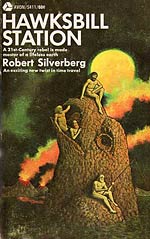
![]() charlesdee
charlesdee
5/6/2012
![]()
This is one of the slighter Silverberg novels I have read, but like all his novels I have read it is entertaining.
In the 21st century, the U.S. has cancelled the constitution and now runs as a syndicalist government. (What exactly is a syndicalist government and why has no GOP candidate accused our sitting president of being a Muslim Syndicalist? It sounds sufficiently damning.) In Silverberg's novel Syndicalism means no more president, no more congress, just commissioners of this and that and an all powerful government designed to disappear once things get back on an even keel. But we know how that goes. Old line dissidents, who saw this coming back in the late 20th century and still protest the new government in their fragmented way, are periodically captured, interrogated, and then sent back one billion years to the Cambrian era where they eke out an existence at Hawksbill Station. (The new regime does not believe in capital punishment as such.) Time travel is a one way ticket. Once you go back there is no technology to ever bring you Up Front as the prisoners refer to the mid 21st century that expelled them.
During the Cambrian era Earth does not yet have dirt or plants or vertebrates, but periodic shipments from Up Front deliver medical supplies, reading material (minus newspapers or anything commenting on the current situation), housing supplies, and occasional treats like candy bars, vegetables and wine. Other than that there is not much but a sea teaming with tribolites and other cephalopods. "I hope you like sea food," is the common greeting to new prisoners.
Life at Hawksbill Station, named after the man who invented time travel, is not that hard but it does eventually drive most men insane. John Barrett, a 20 year Hawksbill veteran, is chief administrator, a natural leader who tries to keep this mix of subversives of various stripes functioning as a unit. He has seen everyone who arrived before him die, and a recent accident on the Cambrian mountainside has left him lame in one leg.
This is Barrett's story, and it began as a novella in 1966 for Galaxy and was lengthened into a novel for Doubleday in 1968. In an introduction to the Berkeley paperback I read, Silverberg says there were two ways to turn a novella into a novel. One was to make conversations longer and add more adjectives. The other was to introduce more character development and background. He admits to having been in the past guilty of the first method, but for Hawksbill he developed scenes that better described the political scene of the 1980's that made radicals of men like John Barrett.
The cock-eyed version of current politics provided by Silverberg makes for what pleasures there are in Hawksbill Station. Don't read the book if you are looking forward to a tale of what it's like to live in the Cambrian age. Living in the Cambrian is really pretty boring. Characters go fishing for tribolites while we stay onshore. But then again, how interesting can trawling for tibolites really be. There are a gillion of them, and they don't try to get away or fight back.
It's the flashback sequences of the late 20th century radicals and the government they oppose that make the novel curious and fun.
The new rulers were oddly assorted. They could not be called either conservative or liberals, as those abused terms had been understood throughout most of the twentieth century. They believed in an activist government philosophy, strong on public works and central planning, which might qualify them as Marxists or at least New Deal liberals. But they also believed in the suppression of dissent for the sake of harmonious endeavor...On the other hand they were unreconstructed capitalists, most of them, who insisted on the supremacy of the business sector of the economy and devoted much energy to restoring the business climate of, say, 1885.
Those who oppose them are so fragmented that even their leaders admit that sometimes they sound far right and other times far left.
As is usual in Silverberg's novels, anything involving sex is, to put it kindly, so of its day that readers are likely to either cringe, wax nostalgic or think, "Damn they had it good back then."
There is a plot involving a new arrival, but it is so obvious that a spoiler alert should be beside the point.
http://www.potatoweather.blogspot.com